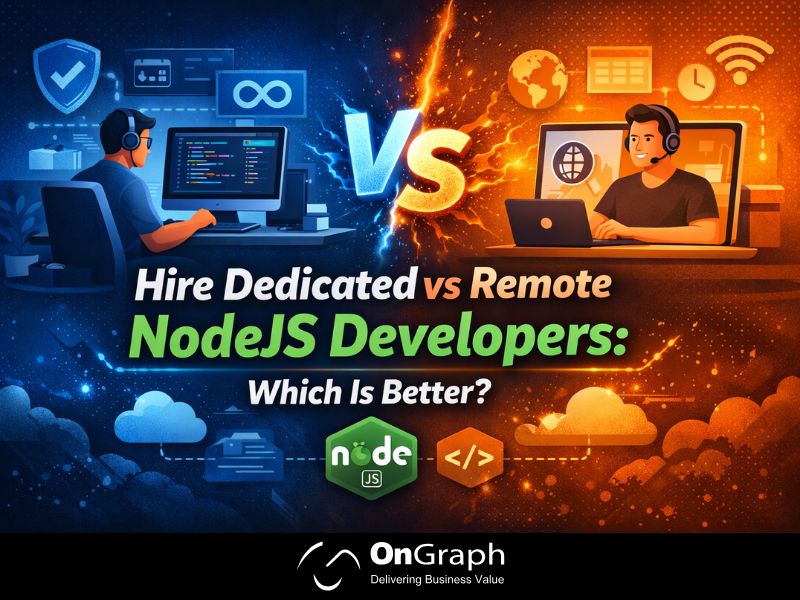In this article
In the world of web development, choosing the right programming language is an important decision. One of the most common comparisons is Python vs PHP. Both have been around for a long time and power thousands of websites, but each comes with its own strengths and weaknesses.
If you’re building a web application or website, you may be wondering: PHP or Python—what’s better for my project? In this blog, we’ll compare both languages based on performance, use cases, ease of learning, scalability, and more. We’ll also include real-world examples and stats to help you make the right choice.
A Quick Overview
| Feature | Python | PHP |
| Year Introduced | 1991 | 1995 |
| Syntax | Clean, readable | Similar to C |
| Primary Use | Web, Data, Automation | Web development only |
| Popular Frameworks | Django, Flask | Laravel, CodeIgniter |
| Community Support | Strong | Strong |
Popularity and Community
According to the Stack Overflow Developer Survey 2024, Python ranks as the 3rd most popular language, while PHP has dropped out of the top 10. Python’s wide use in data science, web apps, and automation has helped it grow fast.
However, PHP still powers over 75% of all websites whose server-side programming language is known, including WordPress. So, while Python is trendy and flexible, PHP has a strong presence in the web space.
Syntax and Learning Curve
If you’re new to programming, Python is easier to learn. Its clean and straightforward syntax makes it a favorite among beginners.
python
CopyEdit
# Python Example
print(“Hello, World!”)
php
CopyEdit
// PHP Example
<?php
echo “Hello, World!”;
?>
Python code looks like plain English. This simplicity allows developers to write and debug code faster, especially when working with large projects. PHP is a bit more complex in syntax but offers robust tools for web development.
Python vs PHP Performance
When it comes to Python vs PHP performance, Python was traditionally slower than PHP. But with improvements in tools and servers (like Django with Gunicorn), Python has caught up.
PHP 8 introduced Just-In-Time (JIT) compilation, which significantly improved speed. According to Phoronix benchmarks, PHP 8.0 is up to 45% faster than PHP 7.4, and in many scenarios, it runs faster than Python for web tasks.
Verdict: PHP is still slightly faster for simple web apps, but Python shines in complex applications where scalability and logic matter more.
Framework Support
Both languages offer excellent frameworks for building websites:
- Python Frameworks: Django (full-stack), Flask (micro)
- PHP: Laravel (full-stack), CodeIgniter, Symfony
Django offers built-in security features, ORM (Object Relational Mapping), and admin dashboards, making it ideal for startups and scalable apps. Laravel, PHP’s most popular framework, provides routing, authentication, and MVC architecture.
If you’re looking for Python Development Services, companies often use Django or Flask for building scalable and maintainable solutions.
On the other hand, PHP Web Development Services usually rely on Laravel for rapid development and cost-effective solutions.
Use Cases & Real-World Examples
Python Projects:
- Instagram: Uses Django to handle massive traffic and data
- Spotify: Python helps with backend logic and data analysis
- Dropbox: The desktop app is written in Python
PHP Projects:
- Facebook (early days): Originally written in PHP
- WordPress: The world’s most popular CMS is PHP-based
- Slack (backend elements): Some parts of their stack use PHP
If you are building a content-driven site, PHP may be better. If your app involves machine learning, APIs, or real-time features, Python is a smarter choice.
Scalability and Security
Python is used in enterprise-level applications due to its robust structure and community support. With tools like Celery and Redis, Python apps can handle millions of users.
PHP is also scalable but often requires more work to manage structure and security. Laravel helps mitigate this by offering built-in tools for security, database migration, and routing.
Python vs PHP performance in large systems often depends on architecture and developer experience rather than language limitations.
PHP or Python: Which One Is Better for You?
| Requirement | Recommended Language |
| Quick website with CMS | PHP |
| Data-heavy app/API | Python |
| E-commerce website | PHP (with Laravel) |
| AI or Machine Learning app | Python |
| Real-time dashboard | Python (with Django) |
| Blog or Portfolio Website | PHP (WordPress) |
So, if you’re building a basic site and want to save on development time and cost, PHP could be a better pick. If you want to create a custom product that involves business logic, integrations, or data handling, Python is more suitable.
Case Study: Fitness App with Python vs PHP
A mid-sized fitness startup was choosing between Python Development Services and PHP Web Development Services. They wanted:
- A dashboard for coaches
- Real-time video session integration
- Analytics for user performance
They chose Python + Django because it allowed faster integration with analytics tools and smoother backend handling for live sessions. The project was launched in 3 months and now supports over 10,000 active users.
If they had chosen PHP, they would’ve needed third-party tools for analytics and custom-built solutions for video integration, which could have delayed the timeline.
Final Verdict
When it comes to Python vs PHP, the best language depends on your project goals:
- Use PHP if you’re working with CMS platforms, small business websites, or need fast deployment.
- Choose Python if your app is data-driven, needs scalability, or involves backend complexity.
Both languages have their place. The smart move is to align your tech choice with your long-term product vision.
Conclusion
Whether you’re a startup, enterprise, or freelancer, the Python vs PHP debate will always come down to your specific needs. Both languages are powerful and battle-tested.
FAQs
Python is a general-purpose programming language used for web development, data analysis, automation, and more. PHP is mainly focused on server-side scripting for web development. While both can be used to build web apps, Python has broader applications beyond just websites.
Python is generally easier for beginners due to its simple and readable syntax. It feels more like English and is great for learning programming concepts. PHP is also beginner-friendly but has a slightly more complex syntax, especially when working with web frameworks.
In terms of performance, PHP 8 has improved significantly with JIT (Just-In-Time) compilation, making it fast for web development. However, Python, especially when used with Django or Flask, offers solid performance for complex backend tasks. Overall, PHP may be slightly faster for basic websites, but Python is better for complex applications.
If your focus is purely on building a website or CMS, PHP is a solid choice, especially with Laravel or WordPress. If you’re building a modern web app with advanced backend logic, integrations, or data handling, Python is often the better option.
Python is used by companies like Instagram, Spotify, Dropbox, and Reddit.
PHP powers Facebook (early days), Wikipedia, and WordPress.com. Both languages are used in large-scale applications, showing their reliability.
- For Python, the most popular frameworks are Django (full-stack) and Flask (lightweight).
- For PHP, Laravel is the leading choice, followed by Symfony and CodeIgniter.
There is no one-size-fits-all answer. Python is growing faster due to its use in data science, machine learning, and web apps. PHP is still strong in traditional web development, especially for CMS and eCommerce platforms. Choose based on your project goals and future scalability.
About the Author
Let’s Create Something Great Together!
Latest Blog
















